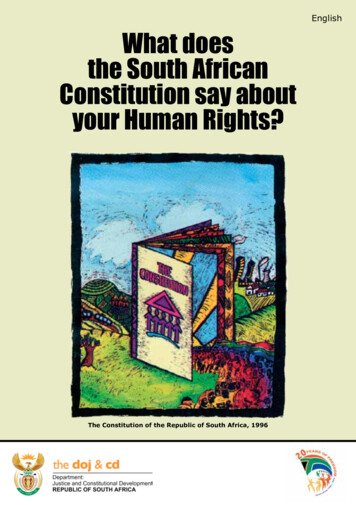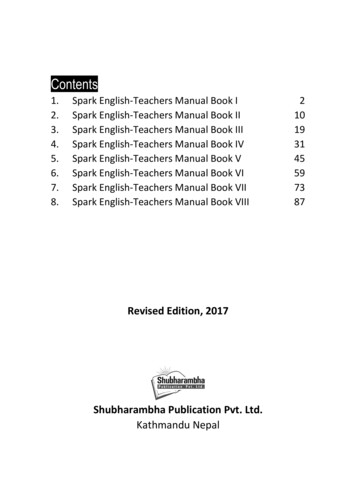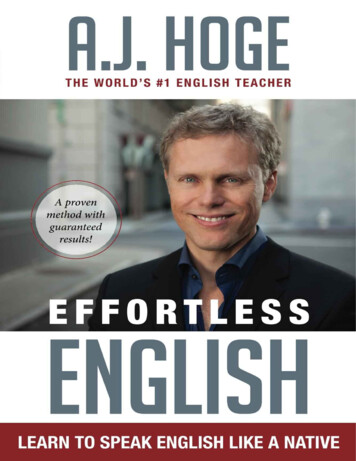
Transcription
What doesthe South AfricanConstitution say aboutyour Human Rights?The Constitution of the Republic of South Africa, 1996English
Humanrightsathe rig rehtseveryonehas.
What does the South AfricanConstitution say about yourHuman Rights?This booklet was last updated in February 2014.1
Table of contentsINTRODUCTION TO HUMAN RIGHTS . 4THE RIGHT TO EQUALITY (SECTION 9). 6THE RIGHT TO HUMAN DIGNITY (SECTION 10). 9THE RIGHT TO LIFE (SECTION 11).9THE RIGHT TO FREEDOM AND SECURITY OF THE PERSON (SECTION 12). 9THE RIGHT AGAINST SLAVERY, SERVITUDE AND FORCED LABOUR (SECTION 13). 10THE RIGHT TO PRIVACY (SECTION 14). 10THE RIGHT TO FREEDOM OF RELIGION, BELIEF AND OPINION (SECTION 15). 11THE RIGHT TO FREEDOM OF EXPRESSION (SECTION 16). 11THE RIGHT TO ASSEMBLY, DEMONSTRATION, PICKETAND PETITION (SECTION 17). 12THE RIGHT TO FREEDOM OF ASSOCIATION (SECTION 18). 12POLITICAL RIGHTS (SECTION 19). 13THE RIGHT NOT TO BE DEPRIVED OF CITIZENSHIP (SECTION 20). 13THE RIGHT TO FREEDOM OF MOVEMENT AND RESIDENCE (SECTION 21). 14THE RIGHT TO FREEDOM OF TRADE, OCCUPATIONAND PROFESSION (SECTION 22). 14WORKERS’ AND EMPLOYERS’ RIGHTS (LABOUR RELATIONS) (SECTION 23). 142
ENVIRONMENTAL RIGHTS (SECTION 24). 15PROPERTY RIGHTS (SECTION 25). 16THE RIGHT OF ACCESS TO HOUSING (SECTION 26). 17THE RIGHT OF ACCESS TO HEALTHCARE, FOOD, WATER ANDSOCIAL SECURITY (SECTION 27). 18THE RIGHTS OF CHILDREN (SECTION 28). 19THE RIGHT TO EDUCATION (SECTION 29). 21THE RIGHT TO LANGUAGE AND CULTURE (SECTION 30). 22THE RIGHTS OF CULTURAL, RELIGIOUS AND LINGUISTICCOMMUNITIES (SECTION 31). 22THE RIGHT OF ACCESS TO INFORMATION (SECTION 32). 23THE RIGHT TO JUST ADMINISTRATIVE ACTION (SECTION 33). 23THE RIGHT OF ACCESS TO COURTS (SECTION 34). 24THE RIGHTS OF ARRESTED, DETAINED AND ACCUSED PERSONS (SECTION 35). 24THE LIMITATION OF RIGHTS (SECTION 36). 26CONCLUSION. 283
KNOW YOUR HUMAN RIGHTSINTRODUCTIONThe Constitution of the Republic of South Africa is the highest law of the land and any law orconduct that is in conflict with it is invalid. According to the Constitution, South Africa is one,sovereign, democratic state founded on the following values: human dignity, the achievementof equality and the advancement of human rights and freedoms. The obligations flowing fromthe Constitution must be followed and respected by every person in South Africa. It is theguiding document for all our laws, and the foundation for lasting freedom and democracy. OurConstitution was adopted by Parliament on 8 May 1996, signed into law by the first President ofa free and democratic South Africa, Mr Nelson Mandela, in Sharpeville on 10 December 1996.During the Constitution making process, the people across the length and breadth of SouthAfrica were invited to make submissions on what should be reflected in the Constitution. Thiswas a unique, exciting and vibrant process where people were given an opportunity to havetheir say.The purpose of the Constitution is to: heal the divisions of the past and establish a society based on democratic values, socialjustice and fundamental human rights; lay the foundations for a democratic and open society in which government is based on thewill of the people and every citizen is equally protected by law; improve the quality of life of all citizens and free the potential of each person; and build a united and democratic South Africa able to take its rightful place as a sovereign statein the family of nations.Chapter 2 of the Constitution contains the Bill of Rights which protects our human rights. TheBill of Rights is the cornerstone of our democracy. It enshrines the rights of all people in ourcountry and affirms the democratic values of human dignity, equality and freedom. Whilst everyperson is entitled to these rights, they also have a responsibility to respect these rights. TheGovernment has a duty to respect, protect, promote and fulfil the rights in the Bill of Rights.The rights in the Bill of Rights are explained in the following paragraphs in the light of the rulingsof the Constitutional Court, useful information from the Constitutional Court website and otherrelevant resources.4
What are thesehuman rights?Human rights are therights everyone has.That’s right!People say they are inthe Constitution. simply because theyare human beings!They are the basicrights the governmentmust protect!Such as theright to life!The right to betreated equally!The right to saywhat you believe!Such as?Great!But if we alreadyhave them.To protectthem!It makes them partof the highest law.why do they have to bein the Constitution?. so you can use them incourt to protect yourself. it’s also very hard for anyoneto take your human rights away!And because it’s veryhard to change theConstitution.Let themjust try!5
THE RIGHT TO EQUALITY (SECTION 9) Everyone is equal before the law and has the right to equal protection and benefit of thelaw. Every person is therefore entitled to equal treatment by our courts. No one is above thelaw and all persons are impartially subject to the law. However, the conduct of the law orgovernment (the executive) that differentiates between people or categories of people maybe justified if it reasonably serves a legitimate government purpose.USEFUL INFORMATION In order to promote the achievement of equality, the State is empowered to make lawsand take measures aimed at protecting or advancing persons, or categories of persons,disadvantaged by unfair discrimination (those that are disadvantaged as a result of apartheidlaws). For example ‘affirmative action’ is one such measure. The Employment Equity Act 55of 1998 seeks to, amongst others, ensure the implementation of employment equity in theworkplace to redress the effects of discrimination, and achieve a diverse workforce broadlyrepresentative of the people of South Africa. No person, including the State, may unfairly discriminate against anyone on the basisof race, gender, sex, pregnancy, marital status, ethnic or social origin, colour, sexualorientation, age, disability, religion,conscience, belief, culture, language andOh no, you won’t Do as I say, or.!birth. This is not a closed list of grounds.not any more!Any action that treats persons differentlyin a way that impairs their fundamentaldignity as human beings or that affectspersons negatively in a comparablyserious manner may amount to unfairdiscrimination. For instance, no personmay unfairly discriminate against anyperson because of his or her HIV status.People who are living with HIV and AIDSmust be treated with compassion andunderstanding and be shown ubuntu,and they must not be denied equalopportunities in employment.BillofRights6
Parliament passed a law to promote equality and prevent unfair discrimination. The law iscalled the Promotion of Equality and Prevention of Unfair Discrimination Act 4 of 2000. TheAct seeks, amongst others, to:- promote equality;- prohibit and prevent unfair discrimination;- prevent and prohibit hate speech;- prevent harrassment;- establish equality courts so that any person who feels he or she is being unfairlydiscriminated against may approach these courts; and- provide remedies for victims of unfair discrimination, hate speech and harassment andpersons whose right to equality has been infringed upon.USEFUL INFORMATIONThe Department of Justice and Constitutional Development has established equality courts todeal with complaints on unfair discrimination, hate speech and harassment.What are Equality Courts and Where to find them?Equality courts are specialised courts designated to hear matters relating to unfair discrimination,hate speech and harassment. In terms of the Act all High Courts are equality courts for theirarea of jurisdiction.The Department of Justice and Constitutional Development has designated all magistrates’courts to serve as equality courts in all the 9 provinces. Although the equality court is a formalcourt sitting, the rules and procedures are more relaxed than in normal courts e.g. the courtroom itself is usually not as intimidating as an ordinary court, the proceedings are held in a roomthat is arranged in boardroom style where the complainant and the respondent sit on either side.Normal rules of the magistrates’ court apply but the presiding officer does not apply them in arigid manner when conducting the proceedings.7
Who can institute Proceedings at the Equality Court?In order to institute proceedings in the equality court it is not a requirement that one must havelegal representation. Proceedings in the equality court may be instituted by: any person acting in his/her own interests; any person acting on behalf of another person who cannot act in his/her own name; any person acting as a member of, or in the interests of a group or class of persons; any person acting in the interest of the public; any association or organization or body acting in the interests of its members; or the South African Human Rights Commission or the Commission on Gender Equality.The Act places specific duties on the South African Human Rights Commission, the Commissionon Gender Equality and other bodies that have been set up in terms of the Constitution. Theyare required to assist complainants in bringing complaint to the equality courts and to conductinvestigations into cases and advise complainants.Does one have to pay to institute proceedings at the EqualityCourt?The equality courts are free of charge in other words the complainant does not have to pay anycourt fees.The South African Human Rights Commission (SAHRC), established by Chapter 9 of theConstitution, may also be approached to take a complaint based on unfair discrimination tothe equality courts. This Commission may also be approached to investigate any complaint ofunfair discrimination. The Commission on Gender Equality (CGE), also established by Chapter 9 ofthe Constitution, may also be approached when the complaint of unfair discrimination is based ongender or sex, and it may also take the complaint to the equality courts.8
The right to equality requires people to respect one another despite the fact that they are different,and they should also acknowledge and accept their differences and celebrate the diversity thatbrings them together. This means that people should be tolerant. Each person has the capacityto free his or her potential without being limited by race, gender, sex, pregnancy, marital status,ethnic or social origin, colour, sexual orientation, age disability, religion, conscience, belief,culture, language and birth.THE RIGHT TO HUMAN DIGNITY (SECTION 10)Everyone has an inherent (inborn) dignity and the right to have his or her dignity respected andprotected. No person should be perceived or treated merely as instruments or objects of the willof others. Every person is entitled to equal concern and to equal respect. This right is relatedto our constitutional purpose of establishing a society in which all human beings will be givenequal dignity and respect.THE RIGHT TO LIFE (SECTION 11)Everyone has a right to life. The courts can no longer sentence convicted persons to death, asthe death penalty has been declared to be in conflict with the Constitution by the ConstitutionalCourt.THE RIGHT TO FREEDOM AND SECURITY OF THE PERSON (SECTION 12) Everyone has the right to freedom and security of the person, which includes the right:- not to be deprived of their freedom without good reason;- not to be locked up in prison without trial;- to be free from all forms of violence;- not to be tortured in any way;- not to be treated or punished in a cruel, inhumane or degrading way;- to make decisions concerning reproduction;- to security in and control over their body; and- not to be forced to participate in medical or scientific experiments.This right also places a duty on every person not to abuse anyone (such as partners, childrenand the elderly).9
THE RIGHT AGAINST SLAVERY, SERVITUDE AND FORCED LABOUR(SECTION 13)No one may be subjected to slavery, servitude or forced labour. This means that no person maybe forced to work for anybody else.THE RIGHT TO PRIVACY (SECTION 14) Everyone has the right to privacy, which includes the right not to have:-their body or home searched;-their property searched;-their possessions taken from them; or-their private communications infringed upon.This right includes the right to be free from interference by the State and others in a person’spersonal life. This right, like any other right, is limited. The law provides that a person may besearched if he or she has been arrested, or a search may be conducted if a search warrant hasbeen issued. There may be instances where a search without a warrant may be conducted,such as when there is a compelling need for the State to protect the public interest, or when apolice official searches a person, container or premises if he or she has reason to believe thata search warrant will be issued to him or her if he or she applies for such warrant and the delayin obtaining such warrant would defeat the object of the search.THE RIGHT TO FREEDOM OF RELIGION, BELIEF AND OPINION(SECTION 15)Everyone has the right to freedom of conscience, religion, thought, belief and opinion. Thismeans, amongst others, that every person has the right to practise the religion of their choice,and furthermore that no person should force his or her religious beliefs on others. Every personis entitled to his or her own belief, thought and opinion, even if they are different from those ofothers.10
THE RIGHT TO FREEDOM OF EXPRESSION (SECTION 16) Everyone has the right to freedom of expression, which includes:-freedom of the press and other media;-freedom to receive or impart information or ideas;-freedom of artistic creativity; and-academic freedom and freedom of scientific research. Every person has the right to express how they feel, even if those expressions are notthe same as others. This may be done by, for example, participating in a public protest inaccordance with the relevant laws. No person is allowed to make expressions of hatred based on race, ethnicity, gender orreligion and expressions that encourage violence or constitute incitement to cause harm.teHaeechsp11
Gather togetherHold a demonstrationBut you must doall of these thingspeacefully and NOWEAPONSSupporttheboycott.Don’t shopherePicketPresent a petitionTHE RIGHT TO ASSEMBLY, DEMONSTRATION, PICKET AND PETITION(SECTION 17)Everyone has the right, peacefully and unarmed, to assemble, to demonstrate, to picket and topresent petitions. This right gives people an opportunity to show their dissatisfaction or demandsin a peaceful manner. However, the Regulation of Gatherings Act 205 of 1993 provides thatorganisers of a demonstration must give the local authority concerned at least seven days’notice. This notice must have, amongst others, the names of the convener, the purpose andplace of the gathering, and the expected number of participants.THE RIGHT TO FREEDOM OF ASSOCIATION (SECTION 18)Everyone has the right to freedom of association. Every person may therefore choose toassociate with whomever he or she wishes. Any person is therefore free to join, for instance, aclub, workers’ union, church, etc. of his or her choice.12
POLITICAL RIGHTS (SECTION 19) Every citizen has the right to freely make political choices, such as the right:-to form a political party; and-to participate in the activities of a political party.We arethefutureWe arethefutureXJoin a political party We arethefutureWe arethefutureXEncourage other people to join a political partyORStart your own political partyEvery citizen has the right:-to free and fair elections;-to vote in secret during the elections; and-to stand for public office and, if elected, to hold office. The Electoral Commission (IEC), established by Chapter 9 of the Constitution, is tasked withthe responsibility of preparing for, and monitoring elections.THE RIGHT NOT TO BE DEPRIVED OF CITIZENSHIP (SECTION 20) No citizen may be deprived of citizenship. Citizenship may not be taken away from a citizen. However, since this right, like any other right, is not absolute, the South African CitizenshipAct 88 of 1995 provides for, amongst others, loss of citizenship.13
THE RIGHT TO FREEDOM OF MOVEMENT AND RESIDENCE (SECTION 21) Everyone has the right:-to move anywhere in South Africa; and-to leave South Africa if they so choose.Every citizen has the right:-to enter, to stay in and to live anywhere in South Africa; and-to have a passport.THE RIGHT TO FREEDOM OF TRADE, OCCUPATION AND PROFESSION(SECTION 22)Every citizen has the right to choose their trade, occupation or profession freely. This rightprotects activities by means of which a livelihood is pursued and is aimed at enabling individualsto live profitable, dignified and fulfilling lives.WORKERS’ AND EMPLOYERS’ RIGHTS (LABOUR RELATIONS)(SECTION 23) Everyone has a right to fair labour practices. The Labour Relations Act 66 of 1995 is themost important law regulating employment relationships. Another important law is the BasicConditions of Employment Act 75 of 1995, which gives effect to the right to fair labourpractices by providing for the regulation of employment conditions such as leave, workinghours (ordinary hours, Sundays and public holidays), employment contracts, employeerecords, salary deductions, pay slips, overtime work and termination of employment. 14Every worker has the right:-to form and join a trade union;-to participate in the activities and programmes of a trade union; and-to strike.
Is this really legal?It is our right!PaidovertimeSupportour strikefor a livingwage As is the case with any other right, the right to strike is not absolute. For instance, certainworkers, whose duties are classified as ‘essential services’, such as members of the SouthAfrican Police Service (SAPS), are not allowed to strike. Employers have the right to form and join an employers’ organisation. They also have a rightto participate in the activities of an employers’ organisation. Workers’ unions, employers’organisations and employers can bargain collectively.ENVIRONMENTAL RIGHTS (SECTION 24) Everyone has the right to an environment that is not harmful to their health or wellbeing. The environment should be protected for the benefit of present and future generationsthrough reasonable measures:-to prevent pollution and damage to natural resources;-to promote conservation; and- to ensure that natural resources are developed, while also promoting the justifiableeconomic and social development of people.15
PROPERTY RIGHTS (SECTION 25) No one may have their property taken awayfrom them unless it is in terms of the law ofgeneral application, and no law may allowarbitrary deprivation of property. Property maybe expropriated (taken away) only in termsof the law of general application for a publicpurpose or in the public interest; and subjectto compensation, which has either be agreedto or decided by a court. The amount of thecompensation and the time and manner of thepayment must be just and fair. The public interest includes the nation’s commitment to landreform, and to reforms to bring about equal access to all South Africa’s natural resources;and the State must take reasonable measures to enable citizens to gain access to land onan equitable (fair and just) basis. A person or community whose tenure of land is legally insecure as a result of past raciallydiscriminatory laws or practices is entitled, either to tenure which is legally secure or to acomparable redress. A person or community who has been occupying land insecurely because of past apartheidlaws or practices is now, to an extent allowed by an Act of Parliament, entitled to eitherlegally securely occupy the land or to comparable redress (in other words to be paid out). A person or community dispossessed (whose property has been taken from them) ofproperty after 19 June 1913 as a result of past racially discriminatory laws or practicesis entitled either to restitution of that property or to equitable redress. No provision of thissection may prevent the State from taking legislative and other measures to achieve land,water, and related reform in order to redress the results of past racial discrimination. Parliament passed the Restitution of Land Rights Act 22 of 1994 which, amongst others:- entitles persons whose land was taken from them after 19 June 1913 due to apartheidlaws to lodge claims not later that 31 December 1998; and- established a Commission on Restitution of Land Rights and the Land Claims Court.This Commission is empowered to investigate claims and to mediate and settle disputes.If such disputes cannot be settled, the Commission must refer the claim to the LandClaims Court.16
THE RIGHT OF ACCESS TO HOUSING (SECTION 26)Back off! The Constitution says no evictionswithout a court order!Everyone has the right to have access to adequate housing. This does not mean that theGovernment is obliged to immediately provide each and every South African with the actualhousing, but it must devise and implement a comprehensive plan that will achieve the goal ofaccess to housing over a period of time. Government must create the conditions for access toadequate housing for all people. This means that, amongst others, for a person to have accessto housing, there has to be land, there has to be services, and there has to be a dwelling. It alsomeans that other agents in our society, including individuals themselves, must be assisted bylaws and other measures to provide housing. A duty is also placed on the Government, all otherentities and persons not to prevent or weaken the right of access to adequate housing.The State has a duty to make reasonable laws and take reasonable steps, within its availableresources, to achieve the progressive realisation of this right. Reasonable measures means thatgovernment must promote laws, adopt and implement policies and programmes that will giveeffect to people gaining access to this. Progressive realisation means that Government must17
move forward and ensure that the rights are realised over a period of time. The phrase “withinits available resources” means that government cannot be expected to do more than what itsavailable resources permit. “The progressive realisation of this right” means that governmentmust implement this right over time; it must take steps to achieve the goal of the Constitution,which is to effectively meet the basic needs of all in our society.No one may be forced out of their home or have their home destroyed without a court ordermade after taking into account all the relevant facts. No laws may allow forced removals to bemade without sufficient reason or without a fair procedure.THE RIGHT OF ACCESS TO HEALTH CARE, FOOD, WATER AND SOCIALSECURITY (SECTION 27) Everyone has the right to have access to:-health care services, including reproductive health care;-sufficient food and water; and- social security, including, if they are unable to support themselves and their dependents,appropriate social assistance. Social security refers to schemes to which workers andemployers contribute for old-age pensions, medical and unemployment insurance.Social assistance means assistance from the government to certain groups such asthe elderly, children in foster care, etc. Examples of such assistance are old-age grants,disability grants, child support grants and foster care grants. No one may be refused emergency medical treatment. This means that a person who suffersfrom a sudden catastrophe, which calls for immediate medical attention, should not berefused ambulance or other emergency services that are available and should not be turnedaway from a hospital that is able to provide the necessary treatment.18
You know it’s all verywell giving people theright to “life”. they need cleanrunning water.free medical carein an emergency.That’s what we needin a Bill of Rights!but for people to live. pensions whenthey grow old. food on the tableSay no more.Absolutely!It is already here.Bill ofRightsAnd the governmentmust try to make surethat everybody’s basicneeds are met!Hey! look out!It’s OK!Hooray!It is? You mean wehave the right to thosethings?Bill ofRightsI’m going tohave a tap!THE RIGHTS OF CHILDREN (SECTION 28) Every person under the age of 18 has the right:-to a name and to a nationality from birth;- to family care or parental care or appropriate alternative care when removed from thefamily environment;-to basic food, shelter, basic health care services and social services;-to be protected from maltreatment, neglect, abuse or degradation;-to be protected from exploitative labour practices;- not to do work that would interfere with his or her wellbeing, education, physical ormental health or spiritual, moral or social development;19
Children need love andsecurityThey need the basicnecessities of life.- not to be detained, except as a measure of last resort and for the shortest period of timeand separately from other detained persons over the age of 18 years;- to a free lawyer, through the Legal Aid Board, in civil proceedings affecting the child ifsubstantial injustice would otherwise result; and-not to be used to take part in wars and to be protected in times of armed conflict. The best interests of a child is the most important concern when it comes to any matteraffecting him or her. These include matters such as custody of and access to children. Section 28 makes special reference to the rights of children in addition to the rest of therights, except where the Constitution has specifically limited the right to adults, such as theright to vote. The purpose of Section 28, which deals with the rights of children, is to protect children insituations where they are particularly vulnerable. The right to ‘family care’ includes the rightto be cared for by the extended family; and the right to alternative care includes the right toadoptive or foster care and the right to be cared for by the state where the child concernedis in need of care.20
The Bill of Rights says allour children will be givenbasic education.Well the Bill of Rights saysthe government must tryto make it available toeveryone.what about higher education.Who will pay for that?OK, but whatabout an adultlike me?When I was a child, therewas no such thing as freeeducation. I never got thechance to go to school!I need an education too!Hey! Where areyou going?I’ve got good newsfor you.The Bill of Rights saysadults also have the right tobasic education!To buy pens andpaper.One for each ofthe kids - and onefor me!21
THE RIGHT TO EDUCATION (SECTION 29) Everyone has the right:- to a basic education, including adult basic education; and- to further education, which the Government, through reasonable measures, must makeavailable and accessible over time. Everyone has the right to be taught at public schools in their own language where thateducation is reasonably practicable taking into account fairness, practicability and the needto address the imbalances of past racially discriminatory law and practices. The official languages are Sepedi, Sesotho, Setswana, siSwati, Tshivenda, Xitsonga,Afrikaans, English, isiNdebele, isiXhosa and isiZulu. Everyone has the right to establish independent educational institutions that do notdiscriminate on the basis of race. These institutions must be registered with government andthey must also maintain the same standards as comparable public educational institutions.THE RIGHT TO LANGUAGE AND CULTURE (SECTION 30)Everyone has the right to use the language and to participate in the cultural life that they choose.A responsibility is placed on everyone, in exercising this right, to respect other human rightswhen they practice this right.THE RIGHTS OF CULTURAL, RELIGIOUS AND LINGUISTIC COMMUNITIES(SECTION 31) Persons belonging to a cultural, religious or linguistic community may not be denied the right,with other members of that community:- to enjoy their culture, practise their religion and use their language; and- to form, join and maintain cultural, religious and linguistic associations and other organsof civil society.
disadvantaged by unfair discrimination (those that are disadvantaged as a result of apartheid laws). For example 'affirmative action' is one such measure. . - not to be forced to participate in medical or scientific experiments. This right also places a duty on every person not to abuse anyone (such as partners, children and the elderly). 10











